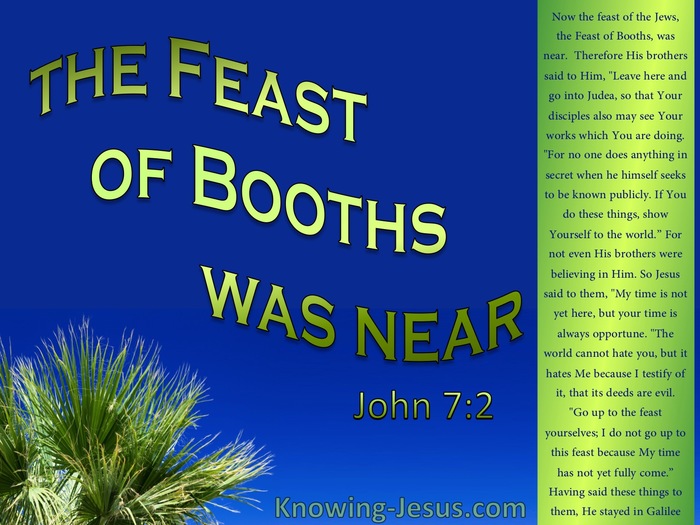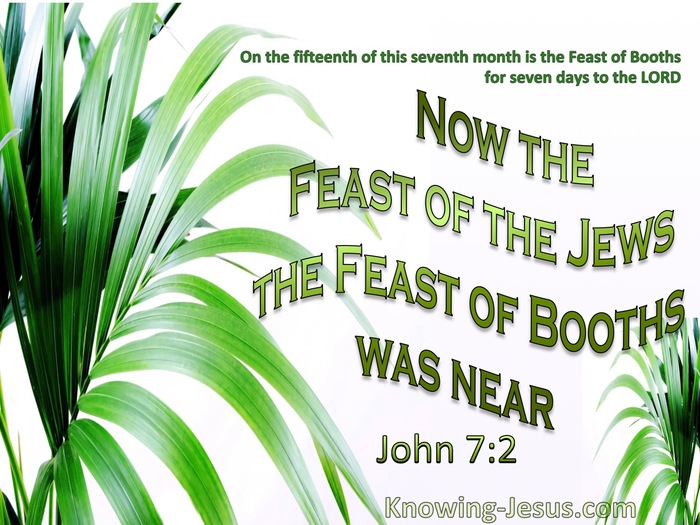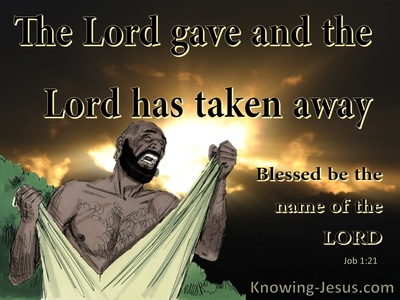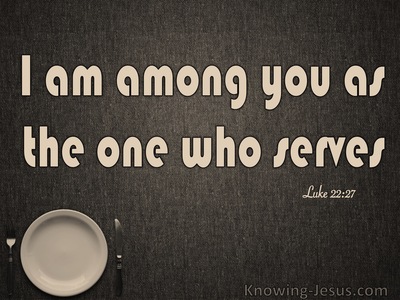◄ What Does John 7:2 Mean? ►
Now the feast of the Jews, the Feast of Booths, was near.
John 7:2(NASB)
Verse of the Day
It was in the third year of Christ's ministry that we read: "The feast of the Jews, the Feast of Booths, was near." Jesus knew the Jews were seeking to kill Him, and so He deliberately delayed His journey to Jerusalem for the Feast of Tabernacles. He remained in Galilee until the last possible moment.
Christ's brothers taunted Him by suggesting that He travel to the City of David and perform his 'crazy' miracles for the entertainment of his disciples and to amuse the crowds who followed Him: "Leave Galilee," they sneered, "and go into Judea, so that Your disciples may see Your works. No one does anything in secret when he himself seeks to be known publicly. Show Yourself to the world!"
These were not the encouraging words of believing brothers, but the teasing taunts of sceptical siblings. However, the Jew's bitter hatred for Jesus had reached boiling point, and they sought to kill Him, which was the reason He delayed His journey.
The Feast of Booths (or the Feast of Tabernacles, as it is often called), was the last of seven feasts given to Moses which Israel were to celebrate each year. It was one of three feast-days which required God-fearing Jews to travel to Jerusalem annually, where it would be celebrated for seven days. It was a reminder of the time when God rescued Israel from Egypt and of their 40 years of wandering in the wilderness. The Feast of Tabernacles was celebrated by living outdoors in 'booths' or tents throughout the festive period.
As with all feasts of the Lord, Tabernacles had a special significance. It pointed to the time when God would come to earth to live among His people. He would first come as the Passover Lamb Who takes away the sin of the World. He would come as the Living Water, the Bread of Life, and the First-fruit from the Dead. He would come as King of the Jews and Saviour of the world: "He came into the world which was made through Him, but the world did not know Him."
He came to His own people, but they did not receive Him. He came to His promised inheritance, but they refused to recognise their King and Saviour. He came to His own city, but the rulers there hated him and sought to kill Him. Finally, they crucified Him on a wooden cross, yet He was innocent of all their accusations.
In this verse we read: "Now the feast of the Jews, the Feast of Booths, was near," and although Jesus delayed His journey to Jerusalem following the taunts of his brothers, we read that Jesus did eventually go up to the Feast of Booths, but He went quietly because His time had not yet come. Six more months were to pass before Christ would be lifted up on the Cross for the sin of the whole world.
It was in the final year of His ministry that we read: "The feast of the Jews was near." How ironic that this seventh, glorious 'Feast-day of the Lord' which was designed to point the Jewish nation to Christ, had become nothing more than a religious ritual that excluded Christ and over time, had been changed from 'The Feast of the LORD' into 'A Feast of the JEWS'.
My Prayer
Heavenly Father, I praise and thank You for the Word of truth and for opening Scripture to my understanding. Thank You that Jesus came to earth and was prepared to suffer the sneering taunts and shocking accusations from His own family members and His own nation, to die on the Cross so that by grace through faith I might believe on His name and be saved. Thank You that despite being rejected and crucified, Jesus is coming back to set up His eternal kingdom on earth. Give me a greater understanding of Your plans and purposes for mankind, and may I live and work for Your greater praise and glory. This I ask in Jesus' name, AMEN.
Choose a Verse from John 7
John 7:2 Further Study
- John 7:2 in the Parallel Bible
- John 7:2 in the Thematic Bible
- John 7:2 Cross References
- John 7:2 Treasury of Scripture Knowing
- John 7:2 Sermons
- John 7:2 Prayers
- John 7:2 Images
- Choose Chapter
Never miss a post















